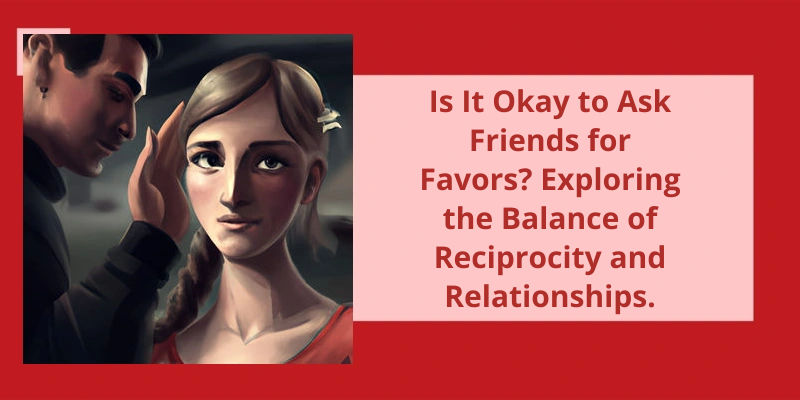As human beings, we’ve the innate ability to empathize with others and put ourselves in their shoes. However, there are times when we may have to make difficult decisions that could potentially affect someone else's life. One such situation arises when someone asks us for a ride, but for various reasons, we’re unable to comply with their request. In such instances, we may be left with a feeling of guilt or remorse, wondering if we should have done more to help. But is it really our responsibility to give someone a ride, or should we be allowed to prioritize our own needs and interests? This is a complex question that requires a deeper understanding of the nature of human relationships and the concept of personal boundaries. So, should we feel bad for not giving someone a ride? Let's explore this topic further.
Is It Rude to Ask People for Rides?
However, I always offer to chip in for gas and even buy her coffee as a thank you. Asking for a ride without any consideration for the inconvenience it may cause the other person is definitely rude. It’s important to be respectful of others time and effort, and to offer compensation as a gesture of appreciation.
Asking for a ride can also depend on the relationship between the two individuals. If it’s a close friend or family member, it may be more acceptable to ask for a ride without offering compensation. In this case, the ride may be seen as a favor between loved ones. However, even in these situations, it’s important to show gratitude and not take the ride for granted.
On the other hand, if it’s a colleague or acquaintance, offering gas money and being considerate of their time is crucial. It’s important to keep in mind that other people have busy schedules and may not have the time or energy to go out of their way for someone else.
Communication is key in these situations, and it’s important to be clear about expectations and offer compensation as necessary. By being considerate and appreciative, asking for a ride can be seen as a helpful gesture rather than an imposition.
How to Politely Decline Giving Someone a Ride
When someone asks for a ride and you aren’t able to give one, it’s important to be polite and respectful. You can simply say that you’re sorry and unable to give a ride at this time. You can also suggest alternative options for transportation such as public transit or a taxi. Avoid making excuses or lying, as this may cause misunderstandings or hurt feelings.
It’s important to remember that you’ve the right to make your own decisions when it comes to your personal safety and comfort. This includes deciding whether or not to offer someone a ride. While it’s understandable that you may want to help others, it’s not always necessary to do so if it makes you feel uncomfortable or puts you in a difficult position. In this article, we’ll explore the etiquette of giving someone a ride and how to handle situations like these with grace and tact.
Is It Rude to Not Give Someone a Ride?
However, if you’ve made a commitment to give someone a ride beforehand, it’s generally considered rude to cancel last minute without a valid reason. This can inconvenience the other person and make them feel disrespected. If you do need to cancel, it’s best to do so as early as possible and offer an apology/explanation.
Another factor to consider is the relationship between you and the person asking for a ride. If it’s a close friend or family member, it may be seen as rude to refuse unless there’s a valid reason. On the other hand, if it’s a mere acquaintance or colleague, it may be more acceptable to decline without too much explanation.
Ultimately, it comes down to being respectful and considerate of others while also maintaining your personal boundaries. It’s okay to say no if you feel uncomfortable or unsafe, but it’s important to communicate your decision in a respectful manner. By doing so, you can avoid any potential misunderstandings or hurt feelings.
This means being honest about your reasons for refusing and offering an apology or explanation if necessary. By doing so, you can avoid any potential conflict and maintain positive relationships with those around you. Remember, it’s always okay to prioritize your own safety and comfort, but it’s important to do so in a way that’s considerate of others.
Source: I absolutely hate being asked to give someone a ride …
It’s important to be honest when you’re unable or unwilling to fulfill someone’s request, including giving someone a ride. By respectfully declining, you allow the person to seek help elsewhere without feeling like they’re inconveniencing you. Moving on from this situation can help prevent any strained relationships or misunderstandings.
What to Say if You Don T Want to Give Someone a Ride?
However, sometimes it can be challenging to say “no” to friends or family members that we care about. It’s essential to keep boundaries in place to prevent feeling overwhelmed or resentful. If you don’t want to give someone a ride, try to be direct but also respectful. Explain your reasons for declining, whether that’s because you’ve prior obligations, you don’t feel comfortable driving at the moment, or any other valid reason.
Another option is to offer an alternative solution. Perhaps you can recommend a taxi service or public transportation that can get the person where they need to go. This shows that you’re willing to help in some way, but just not in the way that they initially requested.
It’s important to remember that you’ve the right to say no. If you feel guilty about it, try to think about the reasons why you don’t want to give a ride. Your time, resources, and energy are valuable, and it’s okay to prioritize your own needs. Saying no might feel uncomfortable in the moment, but it can prevent future stress or discomfort.
If the person persists in asking, try to remain firm but polite. You don’t need to provide further explanations or justifications for your decision. Remember that it’s not your responsibility to please everyone or fulfill every request that comes your way.
When you offer someone a ride, it means that you’re providing transportation for them from one location to another. This can involve driving them in your car, taking them on public transportation, or arranging for a chauffeur to pick them up. The phrase “give somebody a ride” is a common idiom that’s often used when someone needs a lift to another location, such as when they’re stranded or don’t have access to their own transportation. One might ask, for example, “Can you give me a ride home?” in order to request a lift from someone who’s a car.
What Does Give a Ride to Someone Mean?
When someone asks you to give them a ride, they’re typically asking you to drive them somewhere. This could be to their home, to a specific location, or to run an errand. By offering to give them a ride, you’re providing them with transportation that they may not have access to otherwise.
It may also be a way to offer support, whether it’s for a friend going through a tough time or simply for someone who needs a lift.
In some cases, giving someone a ride may require the use of your own vehicle. This means that you’d need to be comfortable with someone else driving your car and possibly using your gas. It’s important to make sure that you’re comfortable with the person you’re giving a ride to and that you’ve a clear understanding of where they need to go and how long the ride will take.
Whether it’s a short trip to the store or a long ride home, your willingness to help can be a valuable resource to those who need it.
Safety Considerations When Giving Someone a Ride
When you’re giving someone a ride, always make sure that both you and the passenger have seat belts on and that the car is in good working condition. Limit distractions, don’t drink and drive, and obey traffic laws to ensure everyone’s safety. Trust your instincts and be cautious if something feels off. It’s better to err on the side of caution than put anyone’s safety at risk.
Showing gratitude and expressing appreciation for a kind gesture from a friend is always important, especially when they go out of their way to provide you with a ride. While a simple ‘thank you’ is always appreciated, there are a few other ways to show your appreciation. Let’s explore them further.
How Do You Thank a Friend for Giving You a Ride?
Giving someone a ride is a generous act and shows that your friend cares about your well-being and convenience. It’s always important to show gratitude for such a kind deed. One way to thank a friend for giving you a ride is to make sure you express your appreciation in a timely manner. Whether you thank them in person, over the phone, or through a message, make sure you let them know how much their help means to you.
Another way to thank your friend is to return the favor. Offering to give them a ride in the future or simply doing something kind for them in return shows that you value and appreciate their friendship. Additionally, you could offer to cover their gas expenses or treat them to a meal as a way of saying thanks.
If you want to add an extra touch of appreciation, consider giving your friend a small gift such as a bouquet of flowers or a gift card to their favorite store or restaurant.
It’s also important to follow up on your gratitude by keeping in touch with your friend. Show them that you value their friendship by making an effort to spend time with them and staying in touch regularly. This will help build a stronger bond between you and your friend.
Remember that showing gratitude is a simple but powerful gesture that can make a big impact on someones day.
Conclusion
In conclusion, when it comes to giving someone a ride, it’s ultimately up to the individual to decide whether or not they’re willing to do so. While it may be seen as a kind gesture, it isn’t always feasible or necessary. It’s important to prioritize one's own needs and safety, and not feel guilty or ashamed for saying no. At the same time, it’s important to communicate respectfully and clearly with others to avoid any misunderstandings or hurt feelings. Ultimately, each situation is unique and requires careful consideration.






